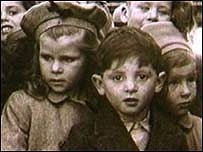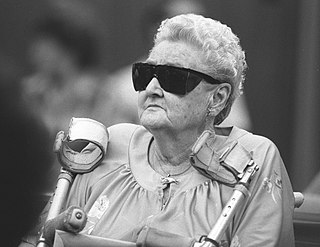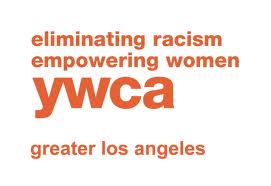Related Research Articles
The Satanic panic is a moral panic consisting of over 12,000 unsubstantiated cases of Satanic ritual abuse starting in the United States in the 1980s, spreading throughout many parts of the world by the late 1990s, and persisting today. The panic originated in 1980 with the publication of Michelle Remembers, a book co-written by Canadian psychiatrist Lawrence Pazder and his patient, Michelle Smith, which used the controversial and now discredited practice of recovered-memory therapy to make claims about satanic ritual abuse involving Smith. The allegations, which arose afterward throughout much of the United States, involved reports of physical and sexual abuse of people in the context of occult or Satanic rituals. Some allegations involve a conspiracy of a global Satanic cult that includes the wealthy and elite in which children are abducted or bred for human sacrifice, pornography, and prostitution.

Head Start is a program of the United States Department of Health and Human Services that provides comprehensive early childhood education, health, nutrition, and parent involvement services to low-income children and families. It is the oldest and largest program of its kind. The program's services and resources are designed to foster stable family relationships, enhance children's physical and emotional well-being, and establish an environment to develop strong cognitive skills. The transition from preschool to elementary school imposes diverse developmental challenges that include requiring the children to engage successfully with their peers outside the family network, adjust to the space of a classroom, and meet the expectations the school setting provides.

Foster care is a system in which a minor has been placed into a ward, group home, or private home of a state-certified caregiver, referred to as a "foster parent", or with a family member approved by the state. The placement of a "foster child" is normally arranged through the government or a social service agency. The institution, group home, or foster parent is compensated for expenses unless with a family member.

A preschool, also known as nursery school, pre-primary school, play school or creche, is an educational establishment or learning space offering early childhood education to children before they begin compulsory education at primary school. It may be publicly or privately operated, and may be subsidized from public funds. The typical age range for preschool in most countries is from 2 to 6 years.

The McMartin preschool trial was a day care sexual abuse case in the 1980s, prosecuted by the Los Angeles District Attorney, Ira Reiner. Members of the McMartin family, who operated a preschool in Manhattan Beach, California, were charged with hundreds of acts of sexual abuse of children in their care. Accusations were made in 1983, with arrests and the pretrial investigation taking place from 1984 to 1987 and trials running from 1987 to 1990. The case lasted seven years but resulted in no convictions, and all charges were dropped in 1990. By the case's end, it had become the longest and most expensive series of criminal trials in American history. The case was part of day-care sex-abuse hysteria, a moral panic over alleged Satanic ritual abuse in the 1980s and early 1990s.
A form of child abuse, child neglect is an act of caregivers that results in depriving a child of their basic needs, such as the failure to provide adequate supervision, health care, clothing, or housing, as well as other physical, emotional, social, educational, and safety needs. All societies have established that there are necessary behaviours a caregiver must provide for a child to develop physically, socially, and emotionally. Causes of neglect may result from several parenting problems including mental disorders, unplanned pregnancy, substance use disorder, unemployment, over employment, domestic violence, and, in special cases, poverty.
The Administration for Children and Families (ACF) is a division of the United States Department of Health and Human Services (HHS). It is headed by the Assistant Secretary of Health and Human Services for Children and Families. It has a $49 billion budget for 60 programs that target children, youth and families. These programs include assistance with welfare, child support enforcement, adoption assistance, foster care, child care, and child abuse. The agency employs approximately 1,700 staff, including 1,200 federal employees and 500 contractors, where 60% are based in Washington, DC, with the remaining in regional offices located in Boston, New York City, Philadelphia, Atlanta, Chicago, Dallas, Kansas City, Denver, San Francisco, Missouri and Seattle.
Early childhood intervention (ECI) is a support and educational system for very young children who have been victims of, or who are at high risk for child abuse and/or neglect as well as children who have developmental delays or disabilities. Some states and regions have chosen to focus these services on children with developmental disabilities or delays, but Early Childhood Intervention is not limited to children with these disabilities.
A group home, congregate living facility, care home, adult family home, etc., is a structured and supervised residence model that provides assisted living and medical care for those with complex health needs. Traditionally, the model has been used for children or young people who cannot live with their families or afford their own homes, people with chronic disabilities who may be adults or seniors, or people with dementia and related aged illnesses. Typically, there are no more than six residents, and there is at least one trained caregiver there 24 hours a day. In some early "model programs", a house manager, night manager, weekend activity coordinator, and four part-time skill teachers were reported. Originally, the term group home referred to homes of 8 to 16 individuals, which was a state-mandated size during deinstitutionalization. Residential nursing facilities, also included in this article, may be as large as 100 individuals in 2015, which is no longer the case in fields such as intellectual and developmental disabilities. Depending on the severity of the condition requiring one to need to live in a group home, some clients are able to attend day programs and most clients are able to live normal lifestyles.
Astrid Heppenstall Heger is a Professor of Clinical Pediatrics at the USC Keck School of Medicine and the founder and Executive Director of the Violence Intervention Program (VIP) at Los Angeles County-USC Medical Center in East Los Angeles.

Substance abuse prevention, also known as drug abuse prevention, is a process that attempts to prevent the onset of substance use or limit the development of problems associated with using psychoactive substances. Prevention efforts may focus on the individual or their surroundings. A concept that is known as "environmental prevention" focuses on changing community conditions or policies so that the availability of substances is reduced as well as the demand. Individual Substance Abuse Prevention, also known as drug abuse prevention involves numerous different sessions depending on the individual to help cease or reduce the use of substances. The time period to help a specific individual can vary based upon many aspects of an individual. The type of Prevention efforts should be based upon the individual's necessities which can also vary. Substance use prevention efforts typically focus on minors and young adults – especially between 12–35 years of age. Substances typically targeted by preventive efforts include alcohol, tobacco, marijuana, inhalants, coke, methamphetamine, steroids, club drugs, and opioids. Community advocacy against substance use is imperative due to the significant increase in opioid overdoses in the United States alone. It has been estimated that about one hundred and thirty individuals continue to lose their lives daily due to opioid overdoses alone.
Family resource programs (FRP) are Canadian community-based organizations that intend to support families in a variety of ways through systems such as family resource centers, family places, family centers, and neighborhood houses. They can also be linked to schools, community centers, child care programs, women's centers, and native friendship centers. This includes programs such as Ontario Early Years and military-funded family centers. They are generally grassroots organizations that aim to be responsive to local issues.
Kathleen 'Kee' MacFarlane is an American social worker known for involvement in the high-profile McMartin preschool trial in the 1980s. She was the Director of Children's Institute International. She developed the concept of the anatomically correct doll for children to use during interviews concerning abuse and played a significant role in the McMartin trial. MacFarlane has been criticized for her methods of interrogating small children. Charges against the defendants were eventually dropped.
Life skills are abilities for adaptive and positive behavior that enable humans to deal effectively with the demands and challenges of life. This concept is also termed as psychosocial competency. The subject varies greatly depending on social norms and community expectations but skills that function for well-being and aid individuals to develop into active and productive members of their communities are considered as life skills.

Friends-International (FI) is an international social enterprise and registered non-governmental organization focusing on children's empowerment established in Cambodia in 1994. Its mission is "to build a future where all children are safe from all forms of abuse, are able to become productive citizens of their countries and contribute to a more equitable and sustainable world." FI works in Cambodia, Indonesia, Laos, Thailand and with almost 50 partners around the world, providing social services to marginalized urban young people and their families.

YWCA Greater Los Angeles is a charitable organization with a focus on addressing issues of poverty, homelessness, domestic violence and skills training for the community.

Nina Revoyr is an American novelist and children's advocate, best known for her award-winning 2003 novel Southland. She is also executive vice president and chief operating officer of Children's Institute, Inc., which provides clinical, youth development, family support and early childhood services to children and families affected by trauma, violence and poverty in Central and South Los Angeles.

First 5 Los Angeles is a nonprofit child-advocacy organization that is part of the First 5 California Children and Families Act.
The Watts Labor Community Action Committee (WLCAC) is a non-profit, 501 (c) 3 organization incorporated in the State of California, in 1965. Its mission "is to improve the quality of life for the residents of Watts and neighboring communities."
References
- ↑ most challenged neighborhoods
- ↑ Minnie Barton
- ↑ first female probation officer
- ↑ Meares, Hadley "Parole Officer No. 2: Minnie Barton and the Crusade for Lost Women" KCET Departures, February 8, 2013
- ↑ "Children's Institute, Inc". EMCF. 11 September 2014. Archived from the original on 28 June 2020. Retrieved 9 September 2020.
- ↑ Social Innovation Fund
- ↑ "Frank Gehry". The Pritzker Architecture Prize. Retrieved 9 September 2020.
- ↑ Kudler, Adrian Glick"Frank Gehry Will Design Building for Abused Children in Watts" Curbed L.A. July 21, 2014
- ↑ Kudler, Adrian Glick (21 July 2014). "Frank Gehry Will Design Campus For At-Risk Children in Watts". Curbed LA. Retrieved 9 September 2020.
- ↑ Miranda, Carolina "Can Frank Gehry Design Change the Dynamic of Watts?" Los Angeles Times, July 24, 2014
- ↑ "Children's Institute's Frank Gehry-designed campus to open June 25". 15 June 2022.
- ↑ "Finding Truth in Child Abuse". Los Angeles Times . 1986-03-05. Retrieved 2008-08-17.[ dead link ]
- ↑ Mydans, S (1990-01-20). "Child Abuse: Some Prosecutions Win". The New York Times . Retrieved 2008-08-17.
- ↑ "30 Years Later, Key Figures Reflect On McMartin Preschool Case". CBS News . August 4, 2014. Retrieved September 15, 2023.
- ↑ "Network Members". The National Child Traumatic Stress Network. 30 November 2017. Retrieved 9 September 2020.
- ↑ "Children's Institute Inc | First 5 LA". www.first5la.org. Archived from the original on 14 July 2014. Retrieved 13 January 2022.
- 1 2 Snedeker MR; Nathan D (1995). Satan's silence: ritual abuse and the making of a modern American witch hunt . New York: Basic Books. p. 127. ISBN 0-465-07180-5.
- ↑ Schreiber, N; Bellah L; Martinez Y; McLaurin K; Stok R; Garven S; Wood J (2006). "Suggestive interviewing in the McMartin Preschool and Kelly Michaels daycare abuse cases: A case study" . Social Influence. 1 (1). Psychology Press: 16–46. doi:10.1080/15534510500361739. S2CID 2322397.
- ↑ Garven, S; Wood JM; Malpass RS; Shaw JS (1998). "More than suggestion: the effect of interviewing techniques from the McMartin Preschool case". Journal of Applied Psychology . 83 (3): 347–59. doi:10.1037/0021-9010.83.3.347. PMID 9648524. S2CID 16766571.
- ↑ Reinhold, R (1990-01-24). "The Longest Trial - A Post-Mortem. Collapse of Child-Abuse Case: So Much Agony for So Little". The New York Times . Retrieved 2008-10-24.